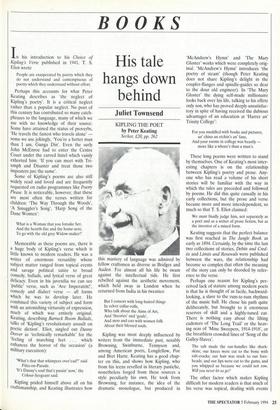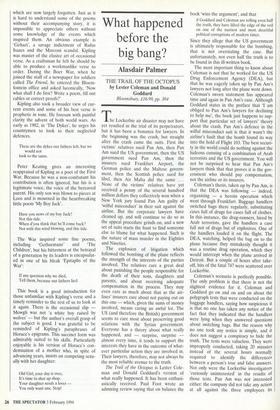BOOKS
His tale hangs down behind
Juliet Townsend
KIPLING THE POET by Peter Keating Secker, f20, pp. 262 In his introduction to his Choice of Kipling's Verse published in 1941, T. S. Eliot wrote People are exasperated by poetry which they do not understand and contemptuous of poetry which they understand without effort.
Perhaps this accounts for what Peter Keating describes as 'the neglect of Kipling's poetry'. It is a critical neglect rather than a popular neglect. No poet of this century has contributed so many catch- Some of Kipling's poems are also still widely read and loved and are frequently requested on radio programmes like Poetry Please. It is noticeable, however, that these are most often the verses written for children: 'The Way Through the Woods', 'A Smuggler's Song', 'Harp Song of the Dane Women':
What is a Woman that you forsake her, And the hearth-fire and the home-acre, To go with the old grey Widow-maker?
Memorable as these poems are, there is a huge body of Kipling's verse which is little known to modern readers. He was a writer of enormous versatility whose subject matter ranged from topical events and savage political satire to broad comedy, ballads, and lyrical verse of great delicacy. Even in his juvenilia we can see 'public' verse, such as 'Ave Imperatrix!', Comedy and dialect verse — all forms which he was to develop later. He Combined this variety of subject and form with an astonishing virtuosity of expression, much of which was entirely original. Keating, describing Barrack Room Ballads, talks of 'Kipling's revolutionary assault on poetic diction'. Eliot, singled out Danny Deever as 'technically remarkable' for the 'feeling of marching feet . . . which enhances the horror of the occasion' (a military execution):
'What's that that whimpers over'ead?' said Files-on-Parade.
'It's Danny's soul that's passin' now,' the Colour-Sergeant said.
Kipling prided himself above all on his craftsmanship, and Keating illustrates how this mastery of language was admired by fellow craftsmen as diverse as Bridges and Auden. For almost all his life he swam against the intellectual tide. He first rebelled against the aesthetic movement, which held sway in London when he returned from India in his twenties:
But I consort with long-haired things In velvet collar-rolls, Who talk about the Aims of Art, And 'theories' and 'goals', And moo and coo with women folk About their blessed souls.
Kipling was most deeply influenced by writers from the immediate past, notably Browning, Swinburne, Tennyson and, among American poets, Longfellow, Poe and Bret Harte. Keating has a good chap- ter on this, and shows how Kipling, who from his teens revelled in literary pastiche, nonetheless forged from these sources a style peculiarly his own. He took from Browning, for instance, the idea of the dramatic monologue, but produced in 'McAndrew's Hymn' and 'The Mary Gloster' works which were completely orig- inal. 'McAndrew's Hymn' introduces 'the poetry of steam' (though Peter Keating does not share Kipling's delight in the coupler-flanges and spindle-guides so dear to the dour old engineer). In 'The Mary Gloster' the dying self-made millionaire looks back over his life, talking to his effete only son, who has proved deeply unsatisfac- tory in spite of having received the dubious advantages of an education at 'limier an' Trinity College':
For you muddled with books and pictures, an' china an etchin's an' fans,
And your rooms in college was beastly - more like a whore's than a man's.
These long poems were written to stand by themselves. One of Keating's most inter- esting chapters is on the relationship between Kipling's poetry and prose. Any- one who has read a volume of his short stories will be familiar with the way in which the tales are preceded and followed by poems. He did this quite casually in his early collections, but the prose and verse became more and more interdependent, so much so that T. S. Eliot claimed:
We must finally judge him, not separately as a poet and as a writer of prose fiction, but as the inventor of a mixed form.
Keating suggests that the perfect balance was first reached in The Jungle Book as early as 1894. Certainly, by the time the last two collections of stories, Debits and Cred- its and Limits and Renewals were published between the wars, the relationship had become so complex that often the meaning of the story can only be decoded by refer- ence to the verse.
Perhaps one reason for Kipling's per- ceived lack of stature among modern poets is that he is thought of as facile, backward- looking, a slave to the rum-te-tum rhythms of the music hall. He chose his path quite deliberately, but brought to it enormous reserves of skill and a highly-tuned ear. There is nothing easy about the lilting cadences of 'The Long Trail' or the heav- ing seas of 'Mine Sweepers, 1914-1918', or the breathless crowded lines of 'Song of the Galley-Slaves'.
The salt made the oar-handles like shark- skins; our knees were cut to the bone with salt-cracks; our hair was stuck to our fore- heads; and our lips were cut to the gums, and you whipped us because we could not row. Will you never let us go?
The other factor which makes Kipling difficult for modern readers is that much of his verse was topical, dealing with events
which are now largely forgotten. Just as it is hard to understand some of the poems without their accompanying story, it is impossible to appreciate others without some knowledge of the events which inspired them. An obvious example is `Gehazi', a savage indictment of Rufus Isaacs and the Marconi scandal. Kipling was master of the elusive art of occasional verse. As a craftsman he felt he should be able to produce a workmanlike verse to order. During the Boer War, when he joined the staff of a newspaper for soldiers called The Friend, he entered the Bloem- fontein office and asked laconically, `Now what shall I do first? Write a poem, fill out cables or correct proofs?'
Kipling also took a broader view of cur- rent events and some of his best verse is prophetic in tone. He foresaw with painful clarity the advent of both world wars. As early as 1902, in `The Dykes', he urges his countrymen to look to their neglected defences.
These are the dykes our fathers left, but we would not look to the same.
Peter Keating gives an interesting reappraisal of Kipling as a poet of the First War. Because he was a non-combatant his contribution is often ignored, but his is a legitimate voice, the voice of the bereaved parent. His only son was blown to pieces at Loos and is mourned in the heartbreaking little poem 'My Boy Jack'.
Have you news of my boy Jack?
Not this tide.
When d'you think that he'll come back?
Not with this wind blowing, and this tide.
The War inspired some fine poems, including `Gethsemane' and 'The Children', but his bitterness at the betrayal of a generation by its leaders is encapsulat- ed in one of his bleak 'Epitaphs of the War': If any question why we died, Tell them, because our fathers lied.
This book is a good introduction for those unfamiliar with Kipling's verse and a timely reminder to the rest of us to look at it again. There is the occasional slip — Mowgli was not 'a white boy raised by wolves' — but the author's overall grasp of the subject is good. I was grateful to be reminded of Kipling's paraphrases of Horace's epigrams. This succinct form was admirably suited to his skills. Particularly enjoyable is his version of Horace's con- demnation of a mother who, in spite of advancing years, insists on competing sexu- ally with her daughter: Old Girl, your day is over, It's time to shut up shop.
Your daughter needs a lover -
You only want one. Stop!



















































 Previous page
Previous page